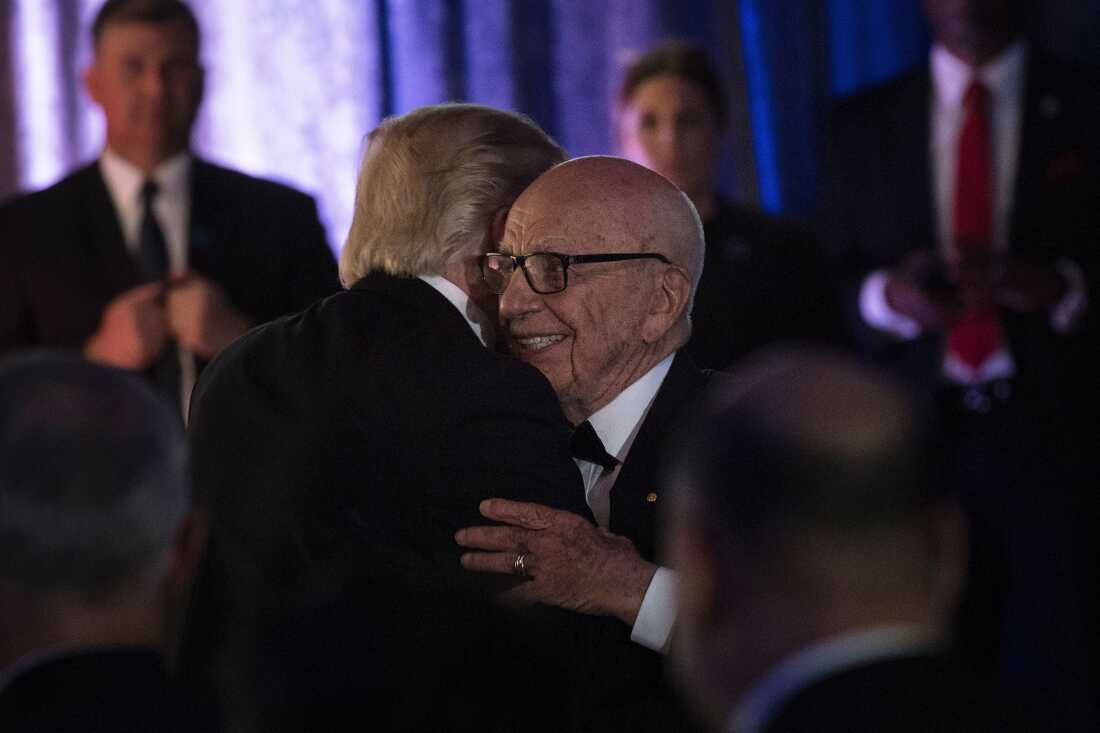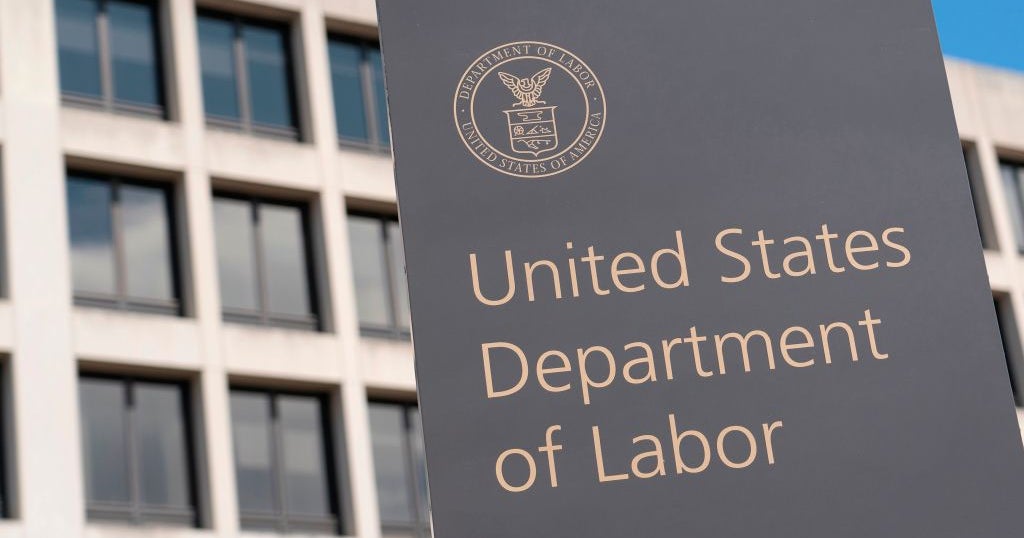

President Trump is embraced by media mogul Rupert Murdoch during a 2017 dinner in New York to commemorate the 75th anniversary of the Battle of the Coral Sea during WWII.
BRENDAN SMIALOWSKI/AFP via Getty Images/AFP
hide caption
toggle caption
BRENDAN SMIALOWSKI/AFP via Getty Images/AFP
President Trump’s defamation lawsuit against the Wall Street Journal and its powerful owner has taken a personal turn.
In the legal filings — and on social media — Trump says he personally told media mogul Rupert Murdoch that that the racy birthday greeting he had supposedly sent two decades earlier to the late disgraced financier Jeffrey Epstein had been faked and did not exist. Murdoch’s Journal reported it anyway, despite Trump’s warning.
Now, Trump is asking a federal judge in Miami to compel the man he once called “my very good friend Rupert Murdoch” to answer his lawyers’ questions under oath within 15 days of the order. Trump’s legal team acknowledges that the ink is barely dry on the lawsuit — there is no schedule of court deadlines yet — but argues that Murdoch is unlikely to testify in person whenever a trial occurs due to his advanced age and health issues.
“Murdoch is 94 years old, has suffered from multiple health issues throughout his life, is believed to have suffered recent significant health scares, and is presumed to live in New York, New York,” the filing states. “Taken together, these factors weigh heavily in determining that Murdoch would be unavailable for in-person testimony at trial.”
The filing repeatedly stresses Murdoch’s age and cites health setbacks, including a reported collapse during a breakfast in London in 2023 with the chief executive of his British holdings, Rebekah Brooks. The judge has ordered Murdoch — the only person Trump asked to be compelled to submit to an accelerated deposition — to respond by the end of Monday.
“The way it’s being framed is almost sarcastic,” says Joseph Azam, a former senior vice president and legal executive for Murdoch’s newspaper and publishing empire. “It’s classic Trump. He is using lawfare, to use his own term, to silence people.
“The problem is he’s going after people who are equally equipped — and in some ways, I would say, better equipped — to navigate this stuff,” Azam tells NPR. The unusual demand to seek an urgent deposition of Rupert Murdoch — and only Rupert Murdoch — feels like “a gratuitous attempt to poke the bear,” Azam says.

Murdoch is the chairman emeritus of News Corp, the corporate parent of the Wall Street Journal, the New York Post and newspapers in the U.K. and his native Australia. His son Lachlan is the company’s chair and his longtime executive Robert Thomson is chief executive. News Corp and a spokesperson for Murdoch have not responded to requests for comment; Dow Jones, the corporate division that oversees the Journal, and the Journal itself declined comment through a spokesperson. Trump’s legal team also declined comment.
Days after the suit was filed, the Journal followed up last week with another scoop: the Justice Department told Trump in May that his name appears among others in the materials it possesses about Epstein. NPR has not independently confirmed the Journal’s initial report. U.S. Attorney General Pam Bondi has said she had briefed the president about the findings. She did not say whether she’d told him his name had appeared.

While outside legal observers question the arguments propelling Trump’s suit, his attorneys have won settlements of $10 million to $25 million from the parent companies of X, ABC, CBS and Facebook over lawsuits that legal experts also consider of thin standing. He has not prevailed at trial, however; Other Trump suits against media companies such as the New York Times, CNN and the Washington Post‘s famed investigative reporter Bob Woodward have been dismissed with little fanfare.
Two titans of the American Right
The two men have known each other for the better part of a half-century from New York City circles: The tabloid owner and the self-promoting real-estate tycoon who fed tidbits about himself to gossip columnists to turbo-charge his name recognition.
The two titans of conservative politics and media struck an alliance of convenience and mutual self-interest over the past decade, since Trump first entered the race for the presidency and won the White House.
Trump has been bolstered by the personalities and programs of Fox News, which Murdoch founded in 1996, as well as by Murdoch’s tabloid New York Post and the Journal‘s conservative editorial pages. The Journal‘s news reports operate apart from its opinion pages — and are far less subject than Murdoch’s tabloids to his political whims. Murdoch typically shows deference to the judgment of news leaders at his most prestigious newspaper. But many viewers and readers of Murdoch’s media holdings are strong supporters of the president.

Media mogul Rupert Murdoch looks on as President Trump speaks to the press as he signs proclamations, initiatives and appointments inside the Oval Office on February 03, 2025.
The Washington Post/The Washington Post via Getty Im/The Washington Post
hide caption
toggle caption
The Washington Post/The Washington Post via Getty Im/The Washington Post
Perhaps the greatest demonstration of that alliance occurred in 2023, when the Murdochs agreed to pay $787.5 million to settle a defamation suit filed by Dominion Voting Systems against Fox News. The voting machine company had sued after Fox’s hosts and guests falsely and repeatedly amplified claims by Trump’s allies that the company had helped rig the 2020 race for Joe Biden.
Yet materials from Fox that became public during that litigation made clear Murdoch did not in private express a high regard for Trump. Documents showed the Murdochs, their executives and their journalists acknowledged to one another that they knew Biden had won the election fairly. Yet they decided they could not risk offending Trump’s voters, who were among their most loyal viewers.
Trump has chafed at Murdoch’s shopping for other candidates in 2024 and the hard-nosed reporting and rebukes published by some of his outlets. For example, Journal editorials have sharply criticized Trump’s push for tariffs and the paper’s reporting has also been a consistent source of irritation.
From ally to ‘malignant’ media
In the case of the Epstein card story, Trump lays the blame on Murdoch himself.
“The Wall Street Journal, and Murdoch, personally, were warned directly by President Donald J. Trump that the supposed letter they printed by President Trump to Epstein was a FAKE and, if they print it, they will be sued,” Trump posted on Truth Social after the story was published. “Mr. Murdoch stated that he would take care of it but, obviously, did not have the power to do so.”
Trump also wrote that he and White House Press Secretary Karoline Leavitt each told the Journal’s editor in chief, Emma Tucker, that the story was untrue and that she “didn’t want to hear that.”
“The Press has to learn to be truthful, and not rely on sources that probably don’t even exist,” Trump wrote.
The Journal has not yet reproduced the birthday greeting from Trump to Epstein that it has described as including a doodle of a naked woman accompanied by the distinctive signature of the future president. Trump’s attorneys say the newspaper does not have it because it does not exist.
In the original lawsuit, Trump’s attorneys say that the Journal “published to the world the false, defamatory, and malignant statements” at the direction of Murdoch and Thomson, his chief executive.
The Journal’s legal team has a reputation — prior to Murdoch’s acquisition of the paper in 2007 and maintained since — of holding its reporting to exacting standards prior to publication and defending it resolutely afterward. Murdoch did not block the Journal from publishing investigative pieces exposing the deceptions behind the blood-testing start-up Theranos — even though he was a major investor in the company and its founder appealed to him to head off the stories. And Trump may not, in truth, want the trial to go to the discovery phase, when Murdoch’s lawyers can obtain previously private documents and ask the president under oath about his relationship with a man now considered one of the nation’s most notorious sex offenders.
Azam, the former News Corp. legal executive, says that Trump appears to have been “trying to call in a favor with an old friend” by warning Murdoch not to publish the Epstein card story. That might work with an item in a social column published in the New York Post but not in news coverage in the Journal, Azam says.
Even so, Trump reached out, as president to newspaper titan — and as one longtime New Yorker to another.
“So long as Rupert is alive — and may he be alive as long as he wants — not a whole lot is going to change when it comes to the core of this type of stuff,” Azam says. “People are still gonna assume that they can call him and he has some magic wand under his desk that can actually make things move.”
With his latest lawsuit, Trump is treating Murdoch like one of the purveyors of what he has denigrated as “fake news.” Not as an independent-minded publisher. And certainly not as an important and loyal ally.



